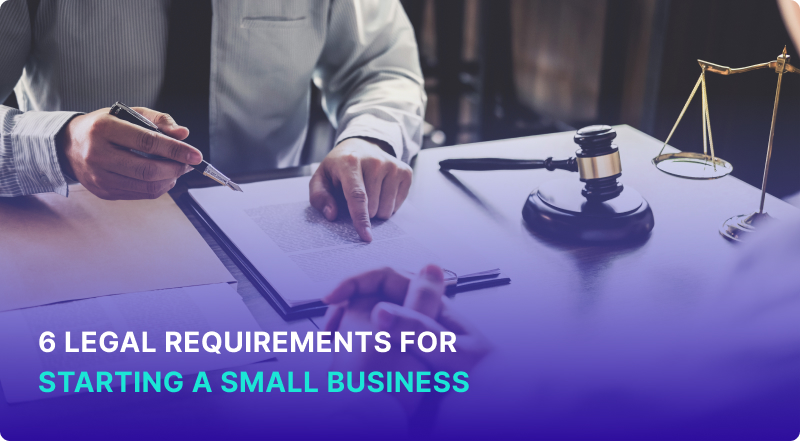| All content presented here and elsewhere is solely intended for informational purposes only. The reader is required to seek professional counsel before beginning any legal or financial endeavor. |
It is important to take these legal requirements for starting a business seriously. You don't want to end up in a situation of having climbed the mountain of starting your own business and making a profit only to find out all the money you made was without a license and is now subject to investigations and fines.
1. Establish Your Business Legal Structure
Small business rules and regulations require you to define how your business will financially interact with the IRS and the US government and determine your future monetary relationship with them. This decision point is critical, because it also affects your liability exposures and how to raise capital for your startup.
- Sole proprietorship is a business that’s owned and operated by one individual. Offers the owner a high degree of control and flexibility and minimal regulatory burden. There is no legal distinction between the business and the owner, which can expose you to unlimited personal liability and suboptimal tax treatment. The structure can also limit your ability to raise capital.
- General partnership is an agreement between two or more people regarding the operation of a business. Outlines each partner’s decision-making authority and claim to net assets and future earnings. All partners are exposed to unlimited personal liability and must report their partnership earnings on their individual tax returns.
- C-corporation a business entity that is legally separate from its owners, which means the corporation and its owners are taxed separately. This can result in double taxation – once at the corporate level and once at the individual level, if taxable distributions are made. A corporation offers its owners protection from personal liability, but it is relatively expensive and complicated to form.
- S-corporation is very similar to a C-corporation, except when it comes to taxation. An S-corporation allows its owners to recognize the business’s tax liability on their individual returns, thereby avoiding the drag of double taxation. However, a business entity must meet specific Internal Revenue Service (IRS) business regulations to qualify as an S-corporation.
- A limited liability company (LLC) is a structure that makes a legal distinction between a business and its owners. It provides the limited liability protection of a corporation and the pass-through taxation of a partnership. See the U.S. Small Business Administration: Different Business Structures. It is similar to an S-corporation, but relatively inexpensive and less complicated to form.

2. Register Your Business Entity’s Name
Once you’ve established your business structure, you need to choose and register your business name. As outlined below, there are four distinct ways to do so.
- A business entity name legally protects your business at a state level by preventing other businesses from operating under similar names. The registration process differs from state to state.
- A trademark legally protects your business entity’s name, products and services at the federal level. You can apply for a trademark through the U.S. Patent and Trademark Office. Trademarks are not required to operate a business, but registering gives you exclusivity rights that do not otherwise exist.
- A DBA (doing business as), which is also known as a trade name, doesn’t offer legal protection, but is generally required if your business uses a name other than its official legal name.
- Domain name: A website address protects your business’s online presence. There is no business regulation to register a domain name, but failure to do so could diminish your ability to effectively brand your business.

3. Obtain an Employer Identification Number (EIN)
After establishing your business structure and registering its name, you must acquire an Employer Identification Number (EIN). This is your business’s identifier for taxation purposes.
It's also relevant for the following:
- Applying for business licenses and permits
- Hiring and paying employees
- Opening commercial bank accounts
- Establishing vendor relationships
Processing Regulatory Filings:
- To qualify for an EIN, business regulations require you:
- To operate primarily within the U.S. or its territories
- Have a legal social security number or taxpayer identification number
- A complete an IRS Form SS-4
If you operate as a sole proprietorship or single member LLC, you are not required to obtain an EIN.
Obtaining one can shield your social security number on business documents and help protest against identity theft. Apply for an EIN number online via the IRS’s EIN Assistant.
The EIN is a federal identification number. Depending on your location, you may also need to obtain a state tax identification number. Visit your state website to determine whether you need one.
4. Obtain Your Business Entity’s Permits and Licenses
- Depending on your industry and where your business is located, you may need to obtain permits and licenses at the federal, state and/or local level.
- A federal license is required for any business involved in activities supervised or regulated by a federal agency: Financial services, transportation, agriculture, broadcasting and alcoholic beverage production, distribution and sales.
- Licensing requirements vary widely at the state and local levels: Be sure to check with the appropriate government bodies to ensure compliance.
5. Protect Your Business Entity with Insurance
- Your business is exposed to a variety of risks.
- The best way to protect against them is via insurance.
- There are several different types of insurance policies that can be used to safeguard your assets and mitigate liability exposures.
- The most common include: commercial property, general liability, professional liability, workers’ compensation and auto insurance.
6. Open a Commercial Bank Account
- Depending on the business structure, it may be a requirement.
- Keeping business and personal finances separate should always be a priority.
- It can mitigate your personal liability exposure.
- It will elevate your business’s professional image and facilitate downstream access to credit facilities.
Where to get free business regulation guidance
Seek guidance and comprehensive support from an experienced attorney when complying with small business rules and regulations. If your business start up costs prevent you from doing so there are organizations that will guide you through this process every step of the way:
- Business Network International
- Young Presidents Organization
- Small Giants Community
- Vistage
- Startup Grind
- Founder Institute
- Baby Bathwater Institute
Other Notable Startup Business Regulations
Here are some more tips for starting a business. In addition to the aforementioned legal requirements, a number of other business startup initiatives warrant disclosure. They aren’t legally-stipulated rules or regulations, but they are essential undertakings for new businesses.
Final Word
Establishing a compliance plan to address the legal requirements for starting a business must be a priority not just ensuring the smooth running of your business but also in acquiring investments and funding.
If this is something you're looking for, explore Torro for your startup business financing needs.

Finimpact.com ranks Torro near the top of its list of business startup loan lenders, largely due to its competitive loan limits, relatively flexible repayment terms and stellar user reviews. You can also check out our startup capital page to get a better insight into this process.
